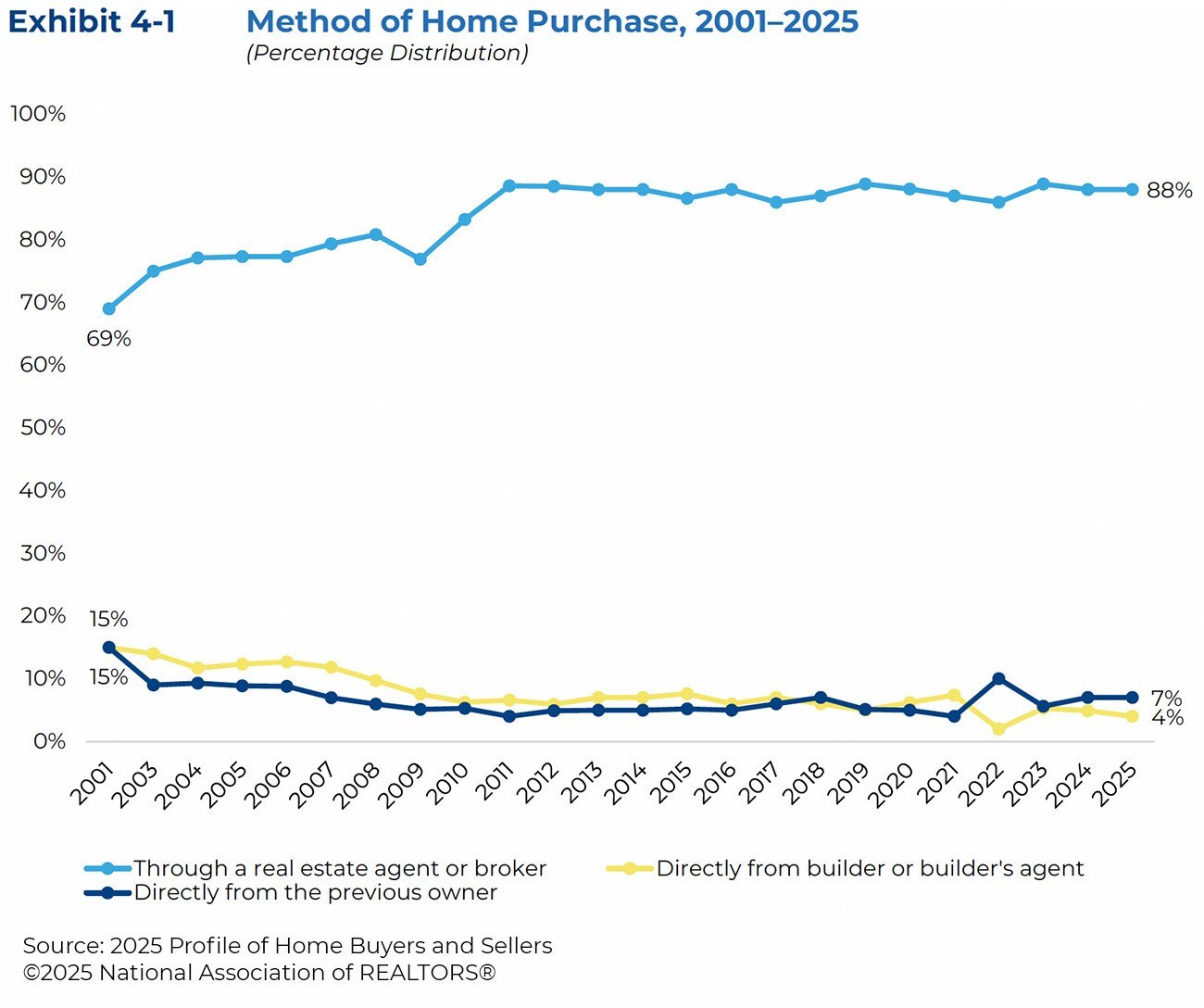The days of trying to sell a home without an agent are dwindling, with For Sale By Owner transactions at an all-time low.
Known as FSBO, those sales now comprise just 5% of home sales, according to the National Association of Realtors 2025 Profile of Home Buyers and Sellers.
That’s 16% less than in 1985, when FSBO transactions made up a sizable 21% of home sales.
“It does not surprise me that FSBO sales are at a historic low,” real estate agent and investor Ron Myers, of Ron Buys Florida Homes, tells Realtor.com®.
“Most homeowners do not realize how much work is involved in selling a home until they try it. You have to deal with paperwork, showings, price negotiations, and the stress of making sure the buyer actually closes. Many times, it just becomes too much.”
Even for experienced real estate professionals, the process of selling a home has many complexities.
“In addition to markets adjusting in many areas with respect to prices, interest rates, and inflation,” says Cara Ameer, real estate broker at Coldwell Banker Vanguard Realty in Florida. “The days of sticking a sign in the yard and expecting 10 people at your front door are long gone.”
While selling a home yourself can be appealing in certain situations, such as when you already have a buyer lined up, the market is exceptionally hot, or you are an experienced seller, “most homeowners tend to see better outcomes when working with a real estate agent,” says Hannah Jones, senior economic research analyst at Realtor.com.
Selling by owner can cost you big bucks
One of the most common reasons people decide to sell by owner is to avoid paying agent commission fees, according to the NAR report.
“But that often backfires,” says Myers. “Homes sit longer, and buyers make low offers. I always tell sellers that trying to save a little money can end up costing them more in the long run.”
FSBO sellers not knowing how to price their property accurately can also affect the bottom line.
“They are going on online estimates, but those estimates have never walked through your property to discuss how it compares to others on the market and how the market is fluctuating at the time the property will be marketed,” real estate broker Michelle Mumoli, of The Mumoli Collective at Compass in Jersey City, NJ, tells Realtor.com.
Over the past year, the median price for a FSBO sale was $360,000, which is 18% lower than agent-listed homes, that sold for a median of $425,000, according to NAR’s data.
Another top reason people sell by owner is that they’re selling to a friend or a family member.
But even if someone is selling to a pal or relative, it is still smart to use a real estate professional, according to Myers.
“Real estate deals are legal contracts,” he says. “Mistakes can cause big problems later. Having someone involved who understands the process helps protect everyone.”
Additional pros and cons of selling by owner
There are a few perks to selling your home.
For instance, Aimee Fink, associate broker at Howard Hanna Real Estate Services in New York City, says you’ll have a more flexible showing schedule.
“You control when showings happen, avoiding last-minute stress,” she explains.
You also have personal knowledge of the neighborhood, which can be a plus.
“Having lived and raised your family there, you can speak firsthand about the community and lifestyle,” says Fink.
When you sell by owner, you also have complete control over pricing. “You decide the listing price without outside pressure,” explains Fink.
FSBO sellers may also benefit from “avoiding some commission costs, maintaining more control, and having flexibility in how they market the property,” says Jones.
But Fink insists the drawbacks vastly outnumber the benefits.
As an FSBO seller, you’ll have limited exposure to the brokerage community. “Fewer agents will show your home, and reduced exposure generally means a lower sale price,” she says. “And without access to comprehensive market data, you may underprice or overprice the property.”
A lack of negotiation skills could cost you big bucks. “Negotiating is a specialized skill set, and without experience, sellers often leave money on the table,” warns Fink.
Fink says a FSBO seller’s lack of experience in getting a home market-ready—and their limited understanding of current laws and regulations—can work against you.
In addition, there’s no buffer between you and the buyer. “This can make the process uncomfortable, emotional, or difficult, especially during negotiations,” says Fink.
Fink also warns that FSBO sellers are higher risk of scams. “FSBO sellers are often targeted by unqualified or fraudulent buyers,” she says.
The advantages of using a real estate agent
According to NAR research, 91% of sellers sold with the assistance of a real estate agent, up from 90% last year. “Sellers placed a high priority on the following three tasks: helping market the home to potential buyers, pricing the home competitively, and selling the home within a specific timeframe,” the report stated.
Other reasons sellers hired real estate agents were because they wanted help finding buyers for the home, and wanted assistance with negotiations and paperwork.
“Real estate agents remain indispensable in today’s complex housing market,” Jessica Lautz, NAR’s deputy chief economist said in a press release. “Beyond guiding buyers and sellers through what is often the largest financial decision of their lives, agents provide critical expertise, negotiation skills and emotional support during an increasingly challenging process.”
In many cases, “this expertise can translate into a higher sales price, a faster timeline, and far less stress for the seller,” says Jones.
According to the survey, the top things FSBO sellers struggled with included pricing their home, preparing it for sale and selling within their desired timeframe. 40% of FSBO sellers admit they didn’t even actively market their home.
“Bottom line, if you are not a professional, selling on your own leaves money on the table and it’s not for faint at heart,” says Mumoli.

